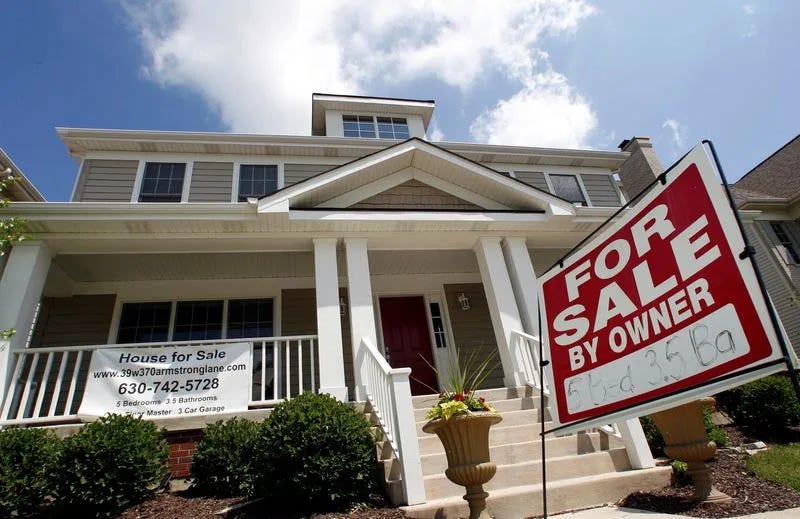- The Money Way
- Posts
- 💸Is Bitcoin price going to crash again?
💸Is Bitcoin price going to crash again?
Huge news

GM.This is The Money Way - the newsletter that makes you smarter about Crypto, Stocks, Real Estate.
Let's see what we’ll discuss today:
📈 September US PCE inflation ticks up
🔥 Is Bitcoin price going to crash again?
😮 Dow, S&P 500 waver after hotter-than-expected inflation print
🏠 US 30-year mortgage rises to 6.73%
Estimated reading time: 5 minutes

September US PCE inflation ticks up

The Commerce Department’s PCE price index, a key Fed inflation gauge, rose 0.2% in September, matching expectations and up from 0.1% in August. Annually, PCE inflation was up 2.1%, the lowest since February 2021, while core PCE (excluding food and energy) rose 0.3% monthly and 2.7% year-over-year.
With inflation moderating, the Fed is expected to cut rates by 25 basis points next week after its recent half-point cut.
Market Reaction:
Stocks: U.S. stock futures dipped, signaling a weaker Wall Street open.
Bonds: Treasury yields slightly fell, with the 10-year at 4.28% and the two-year at 4.17%.
Forex: The dollar index slipped by 0.2%.
US Economy Expands at 2.8% Rate

US Q3 economy grew 2.8%, fueled by household spending and a defense spending surge. Consumer spending, especially on goods, hit its highest since early 2023. Core inflation rose 2.2%, matching Fed targets, as the Fed begins to ease tight policies pre-election. Private-sector hiring stayed strong despite trade setbacks.
Key domestic sales climbed 3.2%, led by federal and defense spending. Business investment, especially in AI, rose, but housing investment declined under high mortgage rates.

Is Bitcoin price going to crash again?

Source: Trading View
Bitcoin’s price surged over 10% between Oct. 26 and Oct. 29, nearing its all-time high at $73,600 before retracting to $72,300. Key indicators, however, suggest potential challenges to the rally’s strength.
Over 99% of Bitcoin holders are now in profit, raising concerns about profit-taking, which could trigger a price pullback. Additionally, Bitcoin's 50-day SMA, nearing "overheated" territory, is at 86.3%, which historically signals a possible correction.
Bitcoin’s RSI has hit overbought levels on multiple timeframes, with the Crypto Fear and Greed Index at "extreme greed." Past peaks in this zone have preceded significant corrections, as seen when BTC fell sharply after reaching a similar level earlier this year.
MicroStrategy to raise $42B to buy Bitcoin in ‘21/21 plan’

MicroStrategy plans to raise $42 billion over the next three years to purchase more Bitcoin under its "21/21 plan," splitting the funds equally between equity and fixed-income securities.
This investment would equal about 578,586 BTC, or 2.7% of Bitcoin's total supply.
MicroStrategy recently also raised $1.01 billion through convertible senior notes, reinforcing its Bitcoin acquisition strategy targeted at institutional investors.

The Crypto Explorer delivers the hottest trends and insights in the world of cryptocurrency.
It's quick, fun, and easy to understand.
Whether you're a seasoned trader or just starting out, this newsletter breaks down complex topics into simple, engaging content.
Stay ahead of the curve with expert analysis, market updates, and tips—all in a quick, easy-to-digest format.

Dow, S&P 500 waver after hotter-than-expected inflation print

Source: Yahoo Finance
US stocks slid Thursday, led by the Nasdaq’s 1% drop after Meta and Microsoft earnings raised concerns over Big Tech’s profitability due to rising AI costs.
Although both firms beat Wall Street estimates, increased spending on AI infrastructure pressured their stock values, impacting the tech-heavy Nasdaq as well as the S&P 500 and Dow.
The pullback extended to Amazon and Apple, ahead of their earnings reports. Meanwhile, the September Personal Consumption Expenditures (PCE) index, a key Fed inflation metric, showed core PCE rose 2.7% year-over-year, slightly above forecasts, maintaining pressure on inflation concerns before the Fed's policy decision next week.

US 30-year mortgage rate surges to 6.73%

The average interest rate for a 30-year fixed mortgage in the U.S. rose to 6.73%, the highest since July, complicating the housing market despite the Federal Reserve's plans to lower short-term borrowing costs.
While mortgage rates had previously decreased, boosting homebuying contracts to a four-year high in September, they quickly rose again due to stronger-than-expected economic data, which alleviated recession fears and led to expectations of slower rate cuts.
Furthermore, rising U.S. 10-year Treasury yields, influenced by political uncertainty ahead of the elections, reached a near four-month high.

Investing Meme 😂


Rate Today’s Edition

DISCLAIMER: None of this is financial advice. This newsletter is strictly educational and is not investment advice or a solicitation to buy or sell any assets or to make any financial decisions. Please be careful and do your own research.